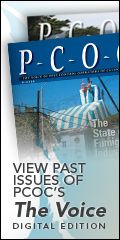
| November 2010 | Past Issues | Printer-Friendly | Advertise | Affiliates Search | Find a Pest Control Operator | PCOC.org |
|
EVP NOTES
The elections this month were in many ways a bit confusing: a huge Republican tide stopped at the Sierra Nevadas. A Democratic sweep of all constitutional offices in California ... yet voters signaled fiscal conservatism by requiring a super majority vote for fee increases. It is no wonder that folks outside the golden state scratch their heads regarding who we elect and what we vote for.
The undeniable fact is that this election was a game changer in a number of significant respects and my point is that PCOC must respond from the strength of an industry which is an essential part of the California economy. We are a nonpartisan organization and our role is to represent the interests and concerns of the pest control industry to legislators and regulators. Although there may be a new sheriff in town, the thrust of our message will still be the same. Hiring a professional will continue to be the context of our strategy to protect and defend the pest control industry in California. The most important strategy we will start immediately is that of education. There will be 40 new legislators in Sacramento. There will be new political appointees in every state agency. It will be critical to our success that we educate these individuals early on regarding the issues that affect the pest control industry in California. We will need to step up our game as it relates to planning education meetings: breakfasts, lunches or dinners with legislators either in Sacramento or in the legislators' districts. We must exploit every opportunity to tell our story. It's now even more important that we organize a system of inviting legislators to spend a day with a pest control professional: ‘adopt-a-legislator.' You will be hearing more about this ambitious plan in the months ahead. There has never been a more important time for members of the pest control industry in California to come together and realize that there is strength in numbers. PCOC will be making a stronger effort to reach out to those members of the industry who do not belong to their trade association and yet derive the benefits of all the work PCOC does. Now is the time. ELECTION RESULTS FOR CALIFORNIA - Analysis by Dominic Dimare
The "Republican" sweepdid not have an impact on California like it did in the rest of the country. In fact, the Democrats swept all of the constitutional offices as well as some legislative races. In addition, there were several propositions that passed that change the way the state handles budget matters. Below is a summary of last night's highlights. GOVERNOR'S RACE California voters (and Jerry Brown) can thank Meg Whitman for Democratic turnout. Up until the "housekeeper gate" scandal, Whitman and Brown were in a dead heat. But after she had proclaimed that undocumented workers shall have no path to citizenship during her first debate against Brown, her undocumented housekeeper of nine years surfaced to say that she was "thrown out like the trash" in 2009 when Whitman decided to run for governor. Whitman's popularity took a nose dive and during the weeks that followed, it was predicted that Brown would easily win by double digits. And then she was booed at a women's conference by 14,000 audience members for not agreeing to take down negative ads against Brown after he agreed he would. This public relations nightmare for Whitman's camp, along with the undocumented worker scandal, empowered a large amount of Latino Democrats in California to head to the polls. Jerry Brown defeated Meg Whitman by more than 10 percentage points for a decisive victory. LIEUTENANT GOVERNOR San Francisco Mayor Gavin Newsom unseated Lt. Gov. Abel Maldonado Tuesday night for lieutenant governor. The Democratic challenger maintained a lead all night over the moderate Republican incumbent in the battle for the unheralded job of lieutenant governor. The final results are showing 50 percent for Newsom and 39 percent for Maldonado. ATTORNEY GENERAL The race for Attorney General is still too close to call at this hour. GOP candidate Steve Cooley's lead over Democrat Kamala Harris has been steadily shrinking and votes from Los Angeles and Alameda counties are still being counted. LEGISLATIVE RACES Due to California's term limit law, there were about 40 new members who were elected Nov. 2. Most of these candidates were running in "safe" seats – there were only five contested general races. Those outcomes are as follows:
In terms of the Legislature, the biggest impact has been the new faces we will see come December, but not the balance of power between the Republicans and Democrats being shifted.
PROPOSITIONS California voters were asked to make decisions on nine propositions that would change the way the state does business. From legalizing and taxing marijuana to repealing business tax credits to changing the voting threshold for passing a state budget, the ballot did not fall short of subject areas. Below are the propositions that impact your industry the most: Prop 19 – Failed
This proposition would have legalized marijuana by allowing people at least 21 years old to possess or cultivate marijuana for personal use. The state would be able to tax the herb, raising $3 billion in much needed revenue for California. Voters rejected this "gateway" proposition.
Prop 20 – Passed
Back in 2008, voters approved Prop 11 which called for the creation of a neutral commission made up of individuals who basically have no vested interest in the political process to draw legislative district lines. (Members of the commission cannot be related to anyone in politics which includes lobbyists, elected and appointed officials, nor could they have contributed more than $250 to any campaign.) Prop 20 expands Prop 11 by putting congressional lines under the commission's jurisdiction. This passed overwhelmingly by the voters.
Prop 23 – Failed
This proposition aimed to overturn the landmark law signed in 2006, the Global Warming Solutions Act, AB 32 which aims to reduce green house gas emissions in California by placing restrictions (and incentives) on businesses. Prop 23 would have essentially suspended AB 32 until California's unemployment rate reached 5.5 percent or less. The voters rejected this proposition.
Prop 24 – Failed
This act would have repealed corporate tax loopholes and prevent corporations from getting tax breaks that are scheduled for 2010 and 2011. These tax breaks were negotiated during the 2008 budget deal. The primary supporter of this proposition was the California Teachers Association and the CalChamber was the primary opponent.
Prop 25 – Passed
This proposition enjoyed a landslide victory on Tuesday. It changes the legislative vote requirement necessary to pass the state budget from two-thirds to a simple majority, while maintaining the two-thirds vote requirement for any tax increases. It also includes a big penalty for lawmakers failing to pass a budget on time. If the Legislature fails to pass a budget by June 15 of each year, all members of the Legislature would permanently forfeit any reimbursement for salary and expenses for every day until the Legislature passes a budget bill.
Prop 26 – Passed
This measure makes it more difficult for certain fees and taxes to be passed by raising the vote threshold from a simple majority to a 2/3 majority vote. It also tightens the definition of what is a fee and what is a tax. The new vote threshold will apply to a variety of fees including fees levied to implement environmental programs such as AB 32 the state's green house gas law.
Prop 27 – Failed
This proposition sought to overturn Prop 11. Some folks who funded this effort didn't like transferring the power to draw district boundaries from the Legislature to a neutral "jury pool." Alas, voters rejected this proposition because they want to actually see Prop 11 implemented. It will be interesting to see next year how these districts will be drawn and which incumbents will be removed from their districts when they will run for re-election in 2012. The districts must be drawn with certain provisions in mind: cities and counties must be kept whole where applicable (no more etch-a-sketch districts), similar demographics and areas of interest must be considered, and incumbent seats must not be regarded.
LEGISLATIVE UPDATE
UPCOMING EVENTS
2010
December 9
UC Berkeley Golf Tournament
SilverRock Resort
Palm Desert, CA
December 10-11
Board of Directors Meeting
Hilton Palm Springs
Palm Springs, CA
2011
January 11
Pest Ed 2011
Quiet Cannon
Montebello, CA
January 12
Pest Ed 2011
Red Lion Inn
Sacramento, CA
March 25-26
Board of Directors Meeting
Marriott Laguna Cliffs Resort
Dana Point, CA
April 26-27
Legislative Days
Hyatt Regency
Sacramento, CA
June 3-4
Leadership Academy 2011
Silverado Resort
Napa, CA
June 23-25
PCOC's 68th Annual Convention & Tradeshow
Disneyland Hotel
Anaheim, CA
September 23-24
Board of Directors Meeting
Embassy Suites
Lake Tahoe, CA
December 9-10
Board of Directors Meeting
Hilton Palm Springs
Palm Springs, CA
BILLY'S BULLETIN BY BILLY GAITHER
PCOC MEMBER BENEFITS MED-NET Med-Net is designed exclusively for PCOC members. Med-Net provides a 24-hour-a-day hotline consultation on pesticide-related medical emergencies by qualified medical doctors. You provide the hotline phone number to your customers when they need to talk to a medical professional regarding a pesticide issue/application in their home. These are trained medical doctors who have access to chemical labels and MSDS sheets and can provide answers and solve problems regarding pesticide exposures with your customers. This service is available only to PCOC members and their customers. The cost of this service is $50.00 yearly. If you are an Insured with the PCOC insurance program then Jenkins Insurance Group will make this payment for you. CHEMTREC Offers shippers and carriers (fumigators) of hazardous materials a cost-effective way to comply with federal DOT regulations, while reducing risk. Offering its 24-hour call center to provide information on clean-up of chemical spills, CHEMTREC works with emergency responders by helping to determine what chemicals are involved, how to protect others at the scene, as well as how to mitigate the incident. PCOC members SAVE $475.00 on this service. Member price is only $75.00, non-member price is $550.00. SMALL BUSINESS ID THEFT Are you completely safe from small business ID theft? Regardless of how safe you think you are, you are never completely immune from the possibility of small business ID theft, fraud, or data breach event. What would your business do if it faced fraudulent activity based on ID theft? How would you respond to customers or clients if their private information was breached? And most importantly, how can you prevent any of this from happening?
What is Small Business Identity Theft? Personal ID theft happens frequently when someone uses another's social security number to obtain fraudulent credit cards, loans, bank accounts and other fraudulent financial access. Identify theft in small business is similar; but more could be at stake. A breach in security could reveal your small business information or your clients' personal information. This information could be used to create unauthorized financial activity in the business' name and begin fraudulent activity with clients' personal information. Either of these instances could result in significant dollars lost or drops in credit scores. Small businesses with less than 100 employees seem to be more at risk. According to the Association of Certified Fraud Examiners (ACFE), the median amount of loss from a small business identity theft is $200,000.00, and most losses take up to two years to discover.
How can you avoid ID Theft? Avoiding ID theft means starting and enforcing strict security policies. Here are a few identity theft tips to help you implement a security policy: Give Personal Info Access to Only Trusted Employees – Much of small business identity theft happens on the inside. An employee with access to personal information, such as credit card numbers, driver's license numbers, social security numbers, and bank account information, can use information for their own personal fraudulent activity or sell it to others who intend to perform fraudulent activities. Make sure you secure your client data. Only specific individuals should have access on computer databases, and hardcopy files should be sealed and stored in a secure location. Secure Your Technology – You most likely have private information stored on database files that can be found on company servers, as well as other laptops, smartphones, PDAs, etc. Establish strict internal controls over what data can be transferred. Keep all data secured with password software. Encrypt data when necessary to prevent hackers from seeing Internet data. Monitor Your Credit – Make a regular check of your small business credit file with all the major credit agencies. Once a year should be the minimum, but preferably at least twice each year. Keeping track of your credit activity will help you spot irregularities and stop fraud in its tracks. Increase Awareness – Another way to avoid ID theft is by creating safety awareness among all your staff and employees. Create a data security policy and make sure everyone within your business knows how to handle private information. Also, inform them of what to do in a security breach situation. These identity theft tips are only a few of the things you can and should do. Avoiding ID theft is possible, and the steps you take will ensure that your business is safe. PEST ED 2011 PCOC and Univar are again presenting PEST ED in January 2011. Mark your calendars now with the dates and locations. Jan. 11, 2011 in Montebello and Jan. 12, 2011 in Sacramento. Jeff Tucker from BASF will be the featured speaker at both locations. Registration forms will be mailed this week and will be made available on the association website, www.pcoc.org.
SCHOLARSHIP APPLICATIONS ARE NOW AVAILABLE ON THE PCOC WEBSITE! DEADLINE IS MARCH 1, 2011! Click here or go to: www.pcoc.org MEMBER VALUE PROGRAM
PCOC MONTHLY INSURANCE/SAFETY TIP
With layoffs, hiring freezes and frozen wages, workers are under more stress today. When does normal stress become mental injury? Does workers' comp cover stress and mental injury?
"My job is driving me crazy!" That's a phrase you're more likely to hear these days. Can a job really drive you crazy, and would it be covered by workers' comp? That depends. Here's an example: Susan is an accountant in a company that is planning to go public. This requires a lot of financial reporting, and Susan has been working 12-hour days, six days a week for several months. At the same time, she is going through a divorce and a custody battle. Susan's supervisor has not been sympathetic about her personal problems. One day Susan finds herself unable to get out of bed. She is physically and emotionally exhausted and blames her intense work schedule. Susan may or may not have a workers' comp mental injury claim, depending on where she lives. Each state has its own rules and regulations regarding emotional stress claims. In California, regulations dictate that the job must account for at least 51 percent of the stress in order to be covered. Susan's case would be open for debate. WORKPLACE TRAUMA If a traumatic or violent event happens at work, employees who suffer immediate emotional stress may have claims that would be denied under normal work conditions. Some state regulations explicitly address violence, and in other states, court rulings have established precedents for dealing with violent acts. STRESS CAUSES INJURIES Whether an employee's stress is caused by workplace problems or personal ones, his or her performance at work may suffer. Stressed-out office employees lose effectiveness, and blue collar workers become more prone to injuries when they feel tired or stressed, leading to more bodily injury claims, lost time and higher comp rates. Whether or not an employee can file a claim, employers should attempt to create a work environment that minimizes employees' stress. Senior managers should monitor frontline supervisors to make sure they are not placing undue stress on subordinates. EMPLOYEE ASSISTANCE Many organizations have employee assistance programs (EAPs) to help workers deal with emotional and psychological problems that may or may not be work-related. According to one EAP provider, ESI, every year 20 percent of employees have a major personal problem that results in an average of three weeks of lost productivity. Companies usually hire an outside firm to handle their EAP. The EAP vendor has the specialization needed to efficiently provide counseling and referrals on a broad range of problems including substance abuse, financial problems, family conflicts, work/life balance and emotional stress. An EAP can also provide a wall of confidentiality, which gives employees confidence that the employer will not be privy to their personal problems. HANDLING A STRESS CLAIM
If one of your employees files a stress or mental injury workers' compensation claim, treat it with the same professionalism as you would any other comp claim and follow your information-gathering procedures. With a stress claim, the employee's overall mental health and his or her personal life may become relevant. This is a sensitive area that your workers' compensation insurer should handle. For more information on avoiding or handling mental stress claims, please contact the PCOC Insurance Program Department at Jenkins Insurance Services at (800) 234-6363. DISTRICT NEWS
NEW MEMBERS
FREQUENTLY REQUESTED INFORMATION
TEMPORARY NPMA LOGIN FOR JOINT MEMBERSHIP LOGIN: 313501 PASSWORD: PCOC PCOC Web site password for 2010-2011: "termite" Please remember, the password changes every July 1! Department of Fish & Game Department of Food & Agriculture Department of Pesticide Regulation Find Your Legislator Healthy Schools Act Structural Pest Control Board |
Pest Control Operators of California |
 |






